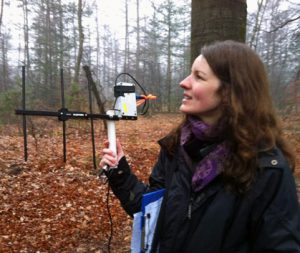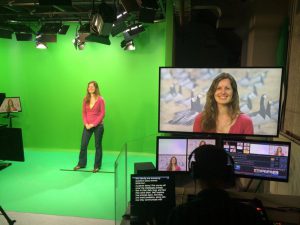What is your scientific background?
I followed a Bachelor Biology (2005-2009 – Utrecht University) and a Master Biology with a specialization in ecology (2009-2011 – Wageningen University). Subsequently, I started a Ph.D. project at Wageningen University, together with the Netherlands Institute of Ecology (NIOO-KNAW), which I finished last year (2012-2016). My Ph.D. project focused on the role of personality in the social networks of great tits (Parus major). After finishing my Ph.D. work I spent some time at Wageningen University to help with the development of the EdX MOOC ‘Introduction to Animal Behaviour’. At the moment I am working on a project studying social dynamics and information transfer in wild Trinidadian guppies (Poecilia reticulata)
Did you have a role model that influenced your decision to work in science?
Not specifically. I just wanted to work with animals and learn about their behaviour. I figured out already at a young age that I should become a biologist to achieve this. Coming across examples like Jane Goodall and Dian Fossey, however, have certainly stimulated me to continue on this path.

How did you choose your field of study?
There was never anything else I wanted to study, actually. First, I thought I wanted to become an ‘ethologist’ (basic animal behaviour), but during my Bachelor, I learned about ‘behavioural ecology’ (animal behaviour in relation to its environment) and decided that this is what I wanted to specialize in. Specifically, the role of the social environment I find fascinating. Why do species differ in social behaviour, why do individuals differ? What are the benefits and costs of being social?
Which topic are you working on at the moment? Why did you choose this topic and how do you think you’ll make a difference?
Since my Ph.D. project, I have been working on the topic of ‘animal social networks’. The topic came with the Ph.D. position I applied for, but I still find it very interesting. Social network analysis also takes into account the indirect links between individuals and all these links can lead to emergent properties of animal societies. They can facilitate rapid information spread, but also the spread of disease. They can indicate inherently stable social groups or groups that are in risk of fragmenting. Both from a basic as an applied (conservation) perspective, social network analysis can generate new insights into animal population dynamics.
What are your biggest achievements, and what your biggest failures?
For my Master thesis, I got a ‘best thesis of the chair group’ award and I was also able to defend my Ph.D. thesis cum laude (best 5%). I am very grateful for these awards, but I think I was also (for a large part) just lucky to get them. I am very proud to have conducted a risky video-playback experiment, which led to some very interesting findings. But, I am most proud of the fact that I did not give up. During my Ph.D., I faced a number of challenges, the biggest that after two years of Ph.D., the tracking system (the basis of the project) still did not work. There were many times that I thought ‘Why am I doing this?’. I think this is a familiar thought for Ph.D. students. But the experience also forced me to become more creative and flexible, very valuable skills, I think, for which I am thankful. My biggest failure? Probably that after all this time I still often think ‘Why am I doing this?’. Are other people doing this work not much smarter and better than me? Are there no other ways I could better help the world? When I stop comparing myself to others, that will be my greatest achievement yet.
What (or who) motivated you in difficult times?

I have been lucky to have some very good friends and a boyfriend who are always very supportive. They show me the cup is half full, whenever I get fixed on the half empty part. Also, my Ph.D. supervisors have been very important for me to stay motivated and keep going. Science, as well as being a scientist, is a team effort.
What is the funniest or most memorable thing that has happened to you while working in science?
One of the first days of my Ph.D. project I had to connect a red wire to a red wire and a black to a black. I failed and ended up ‘blowing up’ one of our only three test tags. Not a great start… But quite funny when looking back at it now. My supervisor never lets me forget about it 😊.
In ten years, what do you hope to have accomplished in terms of your work?
Ideally, I will have integrated my interest and skills in animal behaviour with practical conservation work. I don’t have the ambition to become a professor or an institute director. I just want to study, experience and help nature. To inspire people to really see and protect nature.
Do you come from an academic family?
My father studied medicine, but the academic life was pretty much unknown to me.

How does your family regard your career choice?
They are proud, but they are mostly happy with the fact that I get to do something I love.
Besides your scientific interests, what are your personal interests?
I love traveling, reading a good book and I am a bit of an amateur photographer. I enjoy going on hikes and bike rides. And I have a passion for nature conservation and science writing.
Is it hard to manage both career and private life? How do you manage both?
Being an academic scientist comes with a lot of excitement but also a lot of uncertainty. Short-term contracts (1-2-3 years) all over the world. In addition, a workweek rarely contains less than 40 hours. I do not have children, but I honestly would not know how I would manage if I had. For now, I am happy with the work I get to do.

What were the biggest obstacles you had to overcome? Did you ever have the impression that it would be easier/harder if you were male?
I do not feel I have had to overcome any sex-related-obstacles. I have always experienced a lot of support and the institutes I ‘grew’ up were both led by a female director. Still, I do have the impression it will become more difficult for me later in my career (the leaky pipeline). Many postdocs decide not to have children, while a substantial proportion would like to have them. I think this is something we should all worry about. In addition, I am aware that in some countries it is much less acceptable for women to follow scientific careers. All of us girls that were lucky enough to get where we are now, can set an important example. Show girls all over the world that it is possible for them to become a scientist! The Soapbox Science initiative is a great platform for this.
In your opinion, which changes, if any, are needed in the scientific system to be more attractive to female scientists and possible future scientists?
I think there should be more opportunities (and acceptance) for working part-time in science. Science needs flexible people, but we also need science to become a bit more flexible. This will keep many people motivated and will create more opportunities for people with families.
If you had the option to give advice to a younger version of yourself, what would that be?
Do more of what makes you happy! (and ignore the bullies)
You can contact Lysanne at lysannesnijders@gmail.com and follow her on Twitter.
Lysanne also has a fantastic Website!





